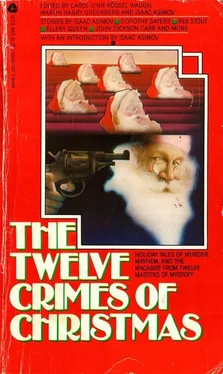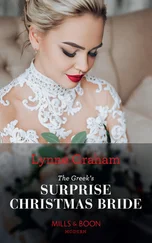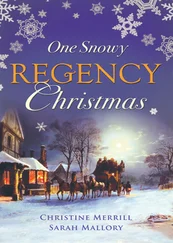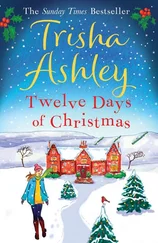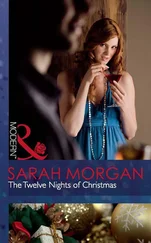Carol-Lynn Waugh - The Twelve Crimes of Christmas
Здесь есть возможность читать онлайн «Carol-Lynn Waugh - The Twelve Crimes of Christmas» весь текст электронной книги совершенно бесплатно (целиком полную версию без сокращений). В некоторых случаях можно слушать аудио, скачать через торрент в формате fb2 и присутствует краткое содержание. Жанр: Триллер, на английском языке. Описание произведения, (предисловие) а так же отзывы посетителей доступны на портале библиотеки ЛибКат.
- Название:The Twelve Crimes of Christmas
- Автор:
- Жанр:
- Год:неизвестен
- ISBN:нет данных
- Рейтинг книги:3 / 5. Голосов: 1
-
Избранное:Добавить в избранное
- Отзывы:
-
Ваша оценка:
- 60
- 1
- 2
- 3
- 4
- 5
The Twelve Crimes of Christmas: краткое содержание, описание и аннотация
Предлагаем к чтению аннотацию, описание, краткое содержание или предисловие (зависит от того, что написал сам автор книги «The Twelve Crimes of Christmas»). Если вы не нашли необходимую информацию о книге — напишите в комментариях, мы постараемся отыскать её.
The Twelve Crimes of Christmas — читать онлайн бесплатно полную книгу (весь текст) целиком
Ниже представлен текст книги, разбитый по страницам. Система сохранения места последней прочитанной страницы, позволяет с удобством читать онлайн бесплатно книгу «The Twelve Crimes of Christmas», без необходимости каждый раз заново искать на чём Вы остановились. Поставьте закладку, и сможете в любой момент перейти на страницу, на которой закончили чтение.
Интервал:
Закладка:
She took them into the library on the right, going ahead with a walk that was like a bounce, and looking over her shoulder out of those long eyes. The library was a long, low room with beams. The windows towards the road were uncurtained; but those in the side wall, where a faded red-brick fireplace stood, were bay windows with draperies closed across them. As their hostess put them before the fire, Hunter could have sworn he saw one of the draperies move.
“You need not worry about it,” she assured him, following his glance towards the bay. “Even if you looked in there, you might not see anything now. I believe some gentleman did try it once, a long time ago. He stayed in the house for a wager. But when he pulled the curtain back, he did not see anything in the bay-at least, anything quite. He felt some hair, and it moved. That is why they have so many lights nowadays.”
Muriel had sat down on a sofa and was lighting a cigarette, to the rather prim disapproval of their hostess, Hunter thought.
“May we have a hot drink?” Muriel asked crisply. “And then, if you don’t mind, we might walk over and meet the Bannisters coming from church.”
“Oh, please don’t do that!” cried the other. She had been standing by the fireplace, her hands folded and turned outwards. Now she ran across to sit down beside Muriel; and the swiftness of her movement, no less than the touch of her hand on Muriel’s arm, made the latter draw back.
Hunter was now completely convinced that their hostess was out of her head. Why she held such fascination for him, though, he could not understand. In her eagerness to keep them there, the girl had come upon a new idea. On a table behind the sofa, bookends held a row of modern novels. Conspicuously displayed-probably due to Molly Bannister’s tact-were two of Rodney Hunter’s detective stories. The girl put a finger on them.
“May I ask if you wrote these?”
He admitted it.
“Then,” she said with sudden composure, “it would probably interest you to hear about the murder. It was a most perplexing business, you know; the police could make nothing of it, and no one ever has been able to solve it.” An arresting eye fixed on his. “It happened out in the hall there. A poor woman was killed where there was no one to kill her, and no one could have done it. But she was murdered.”
Hunter started to get up from his chair; then he changed his mind and sat down again. “Go on,” he said.
“You must forgive me if I am a little uncertain about dates,” she urged. “I think it was in the early eighteen-seventies, and I am sure it was in early February-because of the snow. It was a bad winter then; the farmers’ livestock all died. My people have been bred up in the district for years, and I know that. The house here was much as it is now, except that there was none of this lighting (only paraffin lamps, poor girl!); and you were obliged to pump up what water you wanted; and people read the newspaper quite through, and discussed it for days.
“The people were a little different to look at, too. I am sure I do not understand why we think beards are so strange nowadays; they seem to think that men who had beards never had any emotions. But even young men wore them then, and looked handsome enough. There was a newly married couple living in this house at the time: at least, they had been married only the summer before. They were named Edward and Jane Waycross, and it was considered a good match everywhere.
“Edward Waycross did not have a beard, but he had bushy side-whiskers which he kept curled. He was not a handsome man, either, being somewhat dry and hard-favored; but he was a religious man, and a good man, and an excellent man of business, they say: a manufacturer of agricultural implements at Hawkhurst. He had determined that Jane Anders (as she was) would make him a good wife, and I dare say she did. The girl had several suitors. Although Mr. Waycross was the best match, I know it surprised people a little when she accepted him, because she was thought to have been fond of another man-a more striking man, whom many of the young girls were after. This was Jeremy Wilkes, who came of a very good family but was considered wicked. He was no younger than Mr. Waycross, but he had a great black beard, and wore white waistcoats with gold chains, and drove a gig. Of course, there had been gossip, but that was because Jane Anders was considered pretty.”
Their hostess had been sitting back against the sofa, quietly folding the little white bag with one hand, and speaking in a prim voice. Now she did something which turned her hearers cold.
You have probably seen the same thing done many times. She had been touching her cheek lightly with the fingers of the other hand. In doing so, she touched the flesh at the corner under her lower eyelid, and accidently drew down the corner of that eyelid-which should have exposed the red part of the inner lid at the corner of the eye. It was not red. It was of a sickly pale color.
“In the course of his business dealings,” she went on, “Mr. Waycross had often to go to London, and usually he was obliged to remain overnight. But Jane Waycross was not afraid to remain alone in the house. She had a good servant, a staunch old woman, and a good dog. Even so, Mr. Waycross commended her for her courage.”
The girl smiled. “On the night I wish to tell you of, in February, Mr. Waycross was absent. Unfortunately, too, the old servant was absent; she had been called away as a midwife to attend her cousin, and Jane Waycross had allowed her to go. This was known in the village, since all such affairs are well known, and some uneasiness was felt-this house being isolated, as you know. But she was not afraid.
“It was a very cold night, with a heavy fall of snow which had stopped about nine o’clock. You must know, beyond doubt, that poor Jane Waycross was alive after it had stopped snowing. It must have been nearly half-past nine when a Mr. Moody-a very good and sober man who lived in Hawkhurst-was driving home along the road past this house. As you know, it stands in the middle of a great bare stretch of lawn; and you can see the house clearly from the road. Mr. Moody saw poor Jane at the window of one of the upstairs bedrooms, with a candle in her hand, closing the shutters. But he was not the only witness who saw her alive.
“On that same evening, Mr. Wilkes (the handsome gentleman I spoke to you of a moment ago) had been at a tavern in the village of Five Ashes with Dr. Sutton, the local doctor, and a racing gentleman named Pawley. At about half-past eleven they started to drive home in Mr. Wilkes’s gig to Cross-in-Hand. I am afraid they had been drinking, but they were all in their sober senses. The landlord of the tavern remembered the time because he had stood in the doorway to watch the gig, which had fine yellow wheels, go spanking away as though there were no snow; and Mr. Wilkes in one of the new round hats with a curly brim.
“There was a bright moon. ‘And no danger,’ Dr. Sutton always said afterwards; ‘shadows of trees and fences as clear as though a silhouette-cutter had made ’em for sixpence.’ But when they were passing this house Mr. Wilkes pulled up sharp. There was a bright light in the window of one of the downstairs rooms-this room, in fact. They sat out there looking round the hood of the gig and wondering.
“Mr. Wilkes spoke: ‘I don’t like this,’ he said. ‘You know, gentlemen, that Waycross is still in London; and the lady in question is in the habit of retiring early. I am going up there to find out if anything is wrong.’
“With that he jumped out of the gig, his black beard jutting out and his breath smoking. He said: ‘And if it is a burglar, then, by Something, gentlemen’-I will not repeat the word he used-‘by Something, gentlemen, I’ll settle him.’ He walked through the gate and up to the house-they could follow every step he made-and looked into the windows of this room here. Presently he returned, looking relieved (they could see him by the light of the gig lamps), but wiping the moisture off his forehead.
Читать дальшеИнтервал:
Закладка:
Похожие книги на «The Twelve Crimes of Christmas»
Представляем Вашему вниманию похожие книги на «The Twelve Crimes of Christmas» списком для выбора. Мы отобрали схожую по названию и смыслу литературу в надежде предоставить читателям больше вариантов отыскать новые, интересные, ещё непрочитанные произведения.
Обсуждение, отзывы о книге «The Twelve Crimes of Christmas» и просто собственные мнения читателей. Оставьте ваши комментарии, напишите, что Вы думаете о произведении, его смысле или главных героях. Укажите что конкретно понравилось, а что нет, и почему Вы так считаете.
